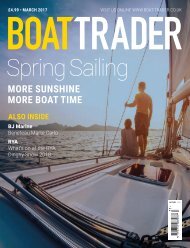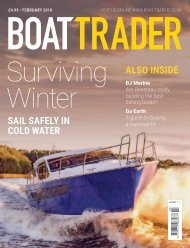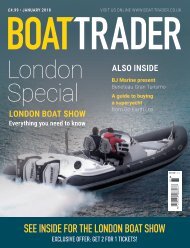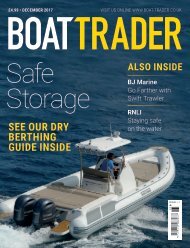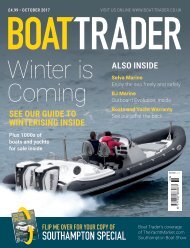Create successful ePaper yourself
Turn your PDF publications into a flip-book with our unique Google optimized e-Paper software.
BOAT TRADER ADVERTORIAL<br />
Three Sheets<br />
to the Wind<br />
If you were totally new to sailing, and you<br />
were asked what a “sheet” was, you’d probably<br />
guess that it was a sail. You might think that<br />
was a reasonable guess, as a sheet is an area<br />
of material as is a sail. You would be right – it<br />
was a reasonable guess – but still wrong. It is<br />
actually the rope that controls a a sail. It comes<br />
from the old English word “sceatline”, meaning<br />
sheet-line. Where “line” means a rope. Except<br />
modern usage omits the “line” bit, confusingly<br />
leaving us just with “sheet”.<br />
So, the mainsheet, <strong>for</strong> example, is actually the<br />
line / rope used to control the main sail (or, to<br />
use the correct term a mainsail without a space<br />
in-between the words).<br />
By now, you will, I hope, have gathered that we<br />
don’t normally call a rope a rope. It is a line or a<br />
sheet.<br />
“Three sheets to the wind” means, as many of<br />
you know and indeed will have practiced, to be<br />
drunk. Very drunk. The derivation of this is at<br />
least fairly logical:-<br />
If three sheets (aka ropes, aka lines) are loose<br />
and blowing about in the wind then the sails will<br />
flap and the boat will lurch about like a drunken<br />
sailor.<br />
Indeed, the logic continues. One sheet to<br />
the wind is slightly drunk, two sheets is that<br />
pleasant in-between state, and three sheets is<br />
that very drunk state.<br />
An example appears in the novel, The Fisher's<br />
Daughter, by Catherine Ward, in 1824:<br />
"Wolf replenished his glass at the request of Mr.<br />
Blust, who, instead of being one sheet in the<br />
wind, was likely to get to three be<strong>for</strong>e he took<br />
his departure."<br />
If all this talk of drink is making you feel groggy,<br />
you might like to know that this is another<br />
venerable nautical expression. ‘Grog’ is a<br />
mixture of rum and water, named after a British<br />
admiral who ordered the rum on board to be<br />
diluted.<br />
You must be<br />
having a luff<br />
Other words seem to have more than one<br />
meaning, no matter how strange the word is.<br />
Take luff as an example. It’s been in use in<br />
sailing since about 1200 AD, so no wonder it has<br />
several meanings.<br />
It is the leading edge of a sail. Easily<br />
remembered as luff has two f’s, so I always think<br />
of front.<br />
However, if you are luffing, you are steering<br />
closer to the wind.<br />
In racing, the term can even be used as meaning<br />
to deliberately obstruct an opponent – to luff<br />
them up.<br />
Luff can also refer to the part of a ship's bow<br />
where the sides begin to curve.<br />
Shackled?<br />
When sailing, you could be “In irons”. No, it does<br />
not mean that you are handcuffed, imprisoned<br />
or made to walk the plank. It simply means that<br />
you are sailing more or less directly into the<br />
wind, and the sails will not drive you <strong>for</strong>ward.<br />
Indeed, you could be stuck.<br />
The origin of in irons is logical. The term dates<br />
from when criminals aboard old sailing ships<br />
were secured to the deck with leg-irons, unable<br />
to move. It somehow, over time, got transferred<br />
to the ship itself being unable to move.<br />
It is also the title of a book by Michael Wayne<br />
Santos, “Caught In Irons: North Atlantic<br />
Fishermen in the Last Days of Sail”.<br />
I would not want to claim that all boating<br />
terminology is strange. An alternative phrase to<br />
being in irons is to be in the no-go zone. That,<br />
at least, is a completely sensible description, as<br />
the writer knows to his cost.<br />
Of course, if you are sailing close to but not in<br />
irons, there are a great variety of expressions to<br />
describe this, such as “sailing on a close reach”,<br />
“beating”, “working on the wind”, “sailing by the<br />
wind” and “sailing full and bye” to name just a<br />
few.<br />
I Haven’t Got a Clew<br />
The meaning of clew is straight<strong>for</strong>ward – it’s the<br />
aft corner of a sail with a hole to attach ropes.<br />
It’s origin, though, is not related to the sail. It is<br />
related to the Old English cliewen "sphere, ball,<br />
skein, ball of thread or yarn,". Yet again, sailing<br />
seems to mix up words related to sails with<br />
those related to the ropes that control them.<br />
Vang or Gnav<br />
I wouldn’t like to argue that all nautical<br />
terminology is crazy. For example, the origin<br />
and meaning of the odd looking words vang and<br />
gnav is almost sensible.<br />
The vang is a system of ropes and pulleys to<br />
stop the boom from rising and to help keep the<br />
mainsail in shape. It’s also known as the kicking<br />
strap. Its located below the boom. The origin<br />
is Dutch – from the word vangen, meaning to<br />
catch.<br />
The gnav is the same, except that it’s located<br />
above the boom.<br />
Conclusion?<br />
If you are new to boating, there is no easy way –<br />
you simply have to learn the terminology. Good<br />
luck!<br />
Martin Berman<br />
Martin Berman is a Director of Go Earth<br />
Ltd, holding a variety of boating and other<br />
qualifications.<br />
Go Earth services division help clients buy<br />
boats more economically. The products<br />
division bring innovative products to the<br />
market that have a real value to boaters.<br />
These include fire extinguishers that don’t<br />
make a mess and automatic fenders that<br />
deploy as you approach a marina without<br />
the crew having to do anything.<br />
This is one in a series of articles that<br />
Martin is writing <strong>for</strong> Boat Trader.<br />
69



